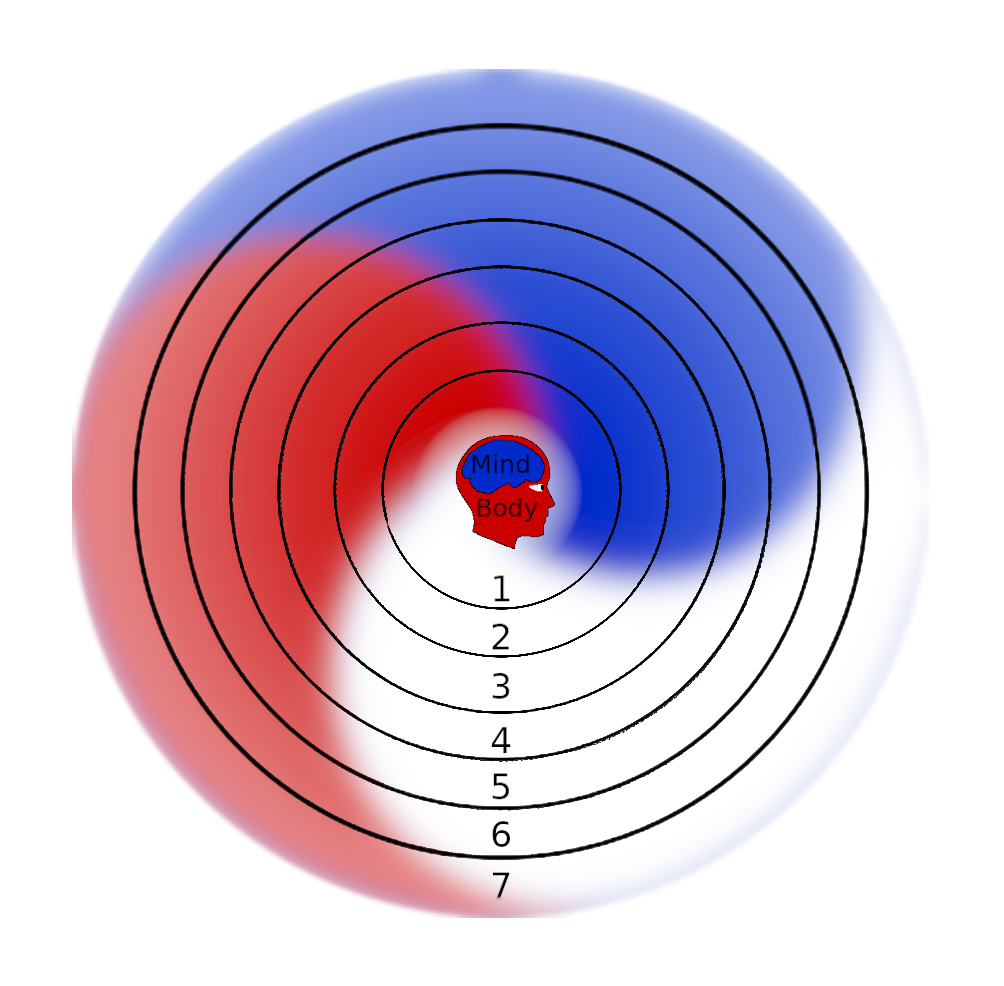Independent Integration, aka Integrity

X or Independent Integration of XSE
Independent Integration (Integrity) can be understood as a state of positive individual strength that encompasses alignment between a person’s mind, body, and spirit. Here’s an explanation of how integrity relates to the cohesion between reasoning and thoughts (mind), words and actions (body), and emotions and beliefs (spirit), as well as its implications for personal growth and constructive living:
Mind (Reasoning and Thoughts): Integrity involves coherence between a person’s reasoning and thoughts. This means that their beliefs, values, and principles are consistent with their intellectual processes and decision-making. A person with integrity thinks critically, exercises sound judgment, and acts in accordance with their ethical standards and convictions.
Body (Words and Actions): Integrity also entails alignment between a person’s words and actions. It means that what a person says is reflected in their behavior and vice versa. Individuals with integrity are honest, reliable, and accountable for their actions. They uphold their commitments, follow through on their promises, and demonstrate consistency between what they say and what they do.
Spirit (Emotions and Beliefs): Integrity further involves harmony between a person’s emotions and beliefs. This encompasses authenticity in aligning one’s feelings with deeply held values, principles, and convictions. Individuals with integrity are genuine, sincere, and true to themselves. They live in accordance with their core beliefs and exhibit congruence between their emotional responses and their underlying beliefs.
An independently integrated person, often referred to as a person of integrity, embodies these qualities across their mind, body, and spirit. They are more likely to utilize their freedom constructively, as they have a strong foundation of self-awareness, self-discipline, and moral clarity. They recognize the importance of living authentically and making choices that are aligned with their values and principles.
By embodying integrity, individuals strengthen not only their own lives but also contribute positively to the lives of others. They inspire trust, foster healthy relationships, and promote a culture of honesty, transparency, and accountability. Moreover, integrity enhances personal independence and the ability to pursue happiness authentically, as individuals navigate life’s challenges with integrity as their compass.
In essence, integrity serves as a guiding principle for constructive living, empowering individuals to lead purposeful, fulfilling lives rooted in authenticity, morality, and personal strength.
Integrity can be synonymous with strength

Integrity of mind, body, and spirit refers to the alignment and harmony between one’s thoughts, actions, and inner essence or values. While it is closely related to strength in certain aspects, it encompasses a broader sense of wholeness and authenticity. Here’s how integrity of mind, body, and spirit can be synonymous with strength:
Integrity of Mind: Having integrity of mind involves maintaining honesty, coherence, and ethical principles in one’s thoughts and actions. It means staying true to one’s beliefs, values, and convictions, even in the face of challenges or temptations. This mental strength enables individuals to make principled decisions, withstand adversity, and persevere in pursuit of their goals.
Integrity of Body: Integrity of body pertains to maintaining physical health, vitality, and balance within one’s ability. It involves reasonably caring for one’s body through regular exercise, proper nutrition, rest, and self-care practices. Physical strength and resilience in many ways are essential components of daily life, enabling individuals to perform daily activities, overcome physical challenges, and adapt to changing circumstances.
Integrity of Spirit: Integrity of spirit encompasses the alignment of one’s innermost values, beliefs, and purpose with their actions and interactions with the world. It involves cultivating a sense of inner peace, authenticity, and connection to something greater than oneself, whether it be a sense of purpose, spirituality, or community. Spiritual strength provides individuals with resilience, meaning, and a sense of direction in life.
In summary, integrity of mind, body, and spirit is synonymous with strength in the sense that it reflects a holistic state of well-being, coherence, and alignment across different aspects of one’s being. It encompasses mental, physical, and spiritual strength, enabling individuals to navigate life’s challenges with integrity, resilience, and authenticity.
AI's depiction of a person who is not of integrity
Here are two digital paintings that portray a person lacking in integrity, acting contrary to what is right. The scenes depict the individual in a dimly lit, cluttered environment, reflecting the chaos of dishonest actions. Their expression of guilt and the shadows cast across their face symbolize moral ambiguity and inner conflict, highlighting the consequences of straying from the path of integrity. -AI


In contrast to Independent integration are duplicity and inner conflict or turmoil, which can be said to cause weakness and a loss of direction, leaving the individual likely to be pushed and pulled by outside forces (or inside forces like unhealthy or destructive emotions), and therefore vulnerable or likely to be duped into making unsound and regretful decisions. Disintegration is a state of fragmentation and division capable of being scattered or reduced to “nothing” by the slightest influence such as a mere breeze.
AI's depiction of a person of Integrity...

Here is a digital painting capturing the essence of a modern person of integrity. Each scene depicts an individual in contemporary attire, confidently standing in an urban environment, using a smartphone as a symbolic gesture of commitment to truth and transparency. Their determined expression and the bustling city at dusk in the background highlight their resolve to uphold principles in the complexities of modern society. -AI
"commitment to truth and transparency"

Integrity, when viewed as a state of positive independent strength, represents a harmonious alignment of the mind, body, and spirit. In this state, an individual operates from a place of wholeness and coherence, where their thoughts, actions, and values are seamlessly integrated. Here’s a breakdown of the components that contribute to this holistic understanding of integrity:
Mind: In the context of integrity, the mind reflects clear and principled thinking. It involves intellectual honesty, a commitment to critical reasoning, and an adherence to one’s core values. An individual with integrity engages in thoughtful decision-making and aligns their actions with their rational understanding of what is right and true.
Body: The physical aspect of integrity involves congruence between one’s actions and their physical presence. It implies consistency in behavior, where external actions are a genuine reflection of internal values. This alignment fosters a sense of trustworthiness, as others can rely on the individual to act in accordance with their principles.
Spirit: Spirituality in this context refers to a deeper sense of self and connection to a greater purpose or set of values. An individual with integrity draws strength from their inner convictions, moral compass, and a sense of purpose. This spiritual dimension provides a foundation for resilience and fortitude, allowing the person to navigate challenges with unwavering resolve.
Cohesive Integration: Integrity is not merely the sum of its parts; it’s the synergy created when the mind, body, and spirit are cohesively integrated. This integration results in a person who is authentic, consistent, and true to themselves. It fosters a sense of internal balance and harmony that radiates through their actions and interactions.
Alignment with Truth and Righteousness: An individual in a state of integrity operates in alignment with their understanding of truth and righteousness. This involves a commitment to ethical behavior, honesty, and a sense of justice. Actions are guided by a moral compass that reflects an unwavering commitment to what is deemed right and just.
Consistency of Words and Deeds: One of the key aspects of integrity is the consistency between what one says and what one does. Words and deeds are in harmony, creating a trustworthy and reliable individual. This consistency builds credibility and fosters trust in relationships, both personal and professional.
In summary, integrity as a state of positive independent strength is a holistic concept that encompasses mental clarity, physical consistency, and spiritual alignment. It represents a person who is unified within themselves, acting in accordance with their values, and contributing to a positive and authentic presence in the world.
XSE's Alpha Axiom: Integrity is Founded on Truth

Integrity is fundamentally rooted in truth because it relies on accuracy, honesty, and alignment with reality. In both personal ethics and fields like systems engineering, integrity ensures that actions, decisions, and systems adhere to factual and consistent principles. Here’s how this connection manifests:
1. Truth as the Foundation of Integrity
- Definition of Integrity: Integrity involves adherence to a moral code or set of principles, often characterized by consistency, honesty, and reliability.
- Role of Truth: Without truth, integrity loses its basis. Being truthful ensures that decisions, statements, and actions align with objective reality, preventing deceit, errors, or harm.
For example, in systems engineering, a truthful representation of data, requirements, and constraints ensures a system’s design is robust and functional.
2. Integrity in Systems Engineering
Systems engineering integrates disciplines to create efficient, reliable, and scalable systems. Integrity in this context revolves around building systems that are honest in their design, execution, and outcomes. Here’s how truth underpins this:
a. Accurate Requirements Capture
- Truth: Accurate and truthful identification of user needs and constraints is the foundation of systems integrity.
- Impact: Misrepresenting or ignoring these truths leads to faulty designs that fail to meet expectations or function improperly.
b. Transparent Communication
- Truth: Honest, clear communication among stakeholders prevents misunderstandings and ensures shared goals.
- Impact: When communication lacks integrity, assumptions and misinformation can derail the project.
c. Valid Testing and Verification
- Truth: Rigorous testing and honest reporting of results ensure the system functions as intended under real-world conditions.
- Impact: Skewing test results or ignoring failures compromises system safety and performance.
d. Ethical Decision-Making
- Truth: Decisions must be grounded in real-world constraints (e.g., technical, environmental, or economic).
- Impact: Ignoring factual limitations risks the creation of unsustainable or unsafe systems.
3. Examples of Truth-Driven Integrity in Systems Engineering
- Software Development: Honest documentation of code and clear reporting of bugs reflect both truth and integrity, ensuring future developers can maintain and improve the system.
- Aerospace Systems: Accurate calculations in trajectory planning rely on truthful application of physical laws. Integrity in data handling prevents catastrophic failures in missions.
- Infrastructure Design: Engineers must truthfully analyze material capabilities and environmental conditions to create structures that are safe and durable.
4. Consequences of a Lack of Integrity (Rooted in Falsehood)
When truth is compromised:
- Systems become unreliable and prone to failure.
- Trust between teams and stakeholders erodes.
- Costs escalate due to rework or system failures.
- In extreme cases, human lives and resources are put at risk.
Conclusion
In systems engineering, as in life, integrity is the application of truth at every level—design, implementation, and operation. It ensures that systems function as intended, stakeholders are aligned, and long-term objectives are met. Integrity without truth is impossible, and truth without integrity loses its transformative potential.
Material Proof of XSE's Alpha Axiom

When discussing material integrity, the concept of integrity as founded on truth becomes even more tangible. Material integrity refers to the ability of a material to maintain its intended structure, properties, and performance under specified conditions. Here’s how truth underpins material integrity, even in systems engineering:
1. Truth in the Definition of Material Integrity
- Definition of Material Integrity: The condition where a material remains whole, reliable, and fit for its purpose, without failure or degradation beyond acceptable limits.
- Role of Truth: Material integrity depends on the truthful understanding and application of the material’s properties, such as strength, durability, and resistance to external factors (e.g., heat, stress, corrosion).
Example:
If a material is falsely represented as having higher tensile strength than it truly does, it could lead to catastrophic failure when used in a load-bearing structure.
2. How Truth Shapes Material Integrity in Systems Engineering
a. Accurate Material Properties
- Truth: Engineers must have precise data on the material’s properties, such as stress limits, fatigue thresholds, and thermal conductivity.
- Impact: Honest and accurate characterization ensures the material performs as expected under real-world conditions.
b. Testing and Validation
- Truth: Material testing (e.g., tensile tests, impact resistance) provides empirical truths about how the material behaves under various conditions.
- Impact: Skipping or falsifying tests leads to designs that fail, compromising the system’s integrity.
c. Environmental Considerations
- Truth: Materials interact with their environment (e.g., corrosion, temperature fluctuations). Truthfully accounting for these effects ensures long-term material integrity.
- Impact: Ignoring these truths could lead to premature degradation or catastrophic failures, such as a bridge collapsing due to unanticipated rust.
d. Manufacturing Integrity
- Truth: Adhering to specified manufacturing processes, such as tolerances and treatments, maintains the material’s designed properties.
- Impact: Deviations from manufacturing truths—like improper alloy mixing or incorrect heat treatments—compromise material integrity.
3. Examples of Truth-Based Material Integrity
a. Aerospace Components
- Materials used in airplanes or spacecraft must withstand extreme conditions (e.g., high stress, temperatures, and vibrations). Truthful assessments of fatigue life ensure safety and reliability during operations.
b. Civil Engineering
- Concrete and steel in buildings and bridges must meet specific load-bearing requirements. Truthfully accounting for material properties and environmental factors (e.g., humidity, freeze-thaw cycles) ensures structural integrity.
c. Medical Devices
- Materials in prosthetics or implants must maintain biocompatibility and mechanical properties over time. Truthful testing of these materials ensures they do not degrade or cause harm to the body.
4. Consequences of Ignoring Truth in Material Integrity
- Failure: Misrepresenting or misunderstanding material properties can lead to cracks, fractures, or catastrophic failures.
- Safety Hazards: Inaccurate data can endanger lives, as seen in cases of bridge collapses or airplane crashes due to material fatigue.
- Economic Loss: Premature degradation increases costs for repairs, lawsuits, and lost trust.
5. Conclusion
Material integrity is fundamentally tied to truth. It demands accurate knowledge of material properties, truthful testing, and honest assessments of environmental factors and manufacturing processes. In systems engineering, truth ensures materials perform as designed, enabling reliable and safe systems that endure the tests of time and stress. Ignoring truth in material integrity risks failures that compromise both systems and lives.
What is Truth?

Truth can be defined as the quality or state of being in accordance with fact or reality. It is a concept that reflects the actual state of affairs or the nature of existence, as opposed to what is false, imagined, or misrepresented. Truth serves as a foundational principle in philosophy, science, ethics, and daily life. Explore more on Truth here.
The 7 Spheres of Integration

In addition to Independent Integration, XSE addresses the environment surrounding the Individual, from their family and home, continuing out into the global realm and even beyond including cyberspace. Whether or not an individual acknowledges these spheres of integration, they do exist, and the integration most certainly is happening, as the life of each person not only is impacted by something within each sphere, but likewise is impacting the environment that they live in, even if the effect is minimal and limited.
If the very core of an individual (body, mind and spirit) are in conflict or disjointed, weak and therefore structurally fragile, everything that is built out from that foundation has a greater possibility of collapsing. The tests that come with the storms of business and life in general are inevitable and during those times, true character, strength and courage is evidenced.
Above are the 7 Spheres of Integration that XSE references when assessing impact on or from any particular system of interest:
- Independent Integration or X (Body, Mind & Soul)
- Family/Home
- Professional/Business,
- Local/Community
- National/Country
- Global
- Beyond
What does AI know about integrity? Is it more than you know?

Integrity is a complex and multi-faceted concept that generally refers to the quality of being honest, having strong moral principles, and adhering to a code of ethical conduct. It involves the consistency of actions, values, methods, measures, and principles. Here are key aspects of the definition of integrity:
Honesty: Integrity implies truthfulness and sincerity. Individuals with integrity are honest in their interactions, communications, and dealings with others.
Moral Principles: It involves a commitment to moral and ethical principles. People of integrity strive to do what is right, just, and fair, even in challenging situations.
Consistency: Integrity involves consistency in behavior and actions. It means that individuals act in alignment with their values and principles across various situations and contexts.
Reliability: Those with integrity are reliable and can be trusted. They fulfill their commitments and obligations, and others can depend on them.
Transparency: Integrity often involves transparency in one’s actions and decision-making. Openness and clarity contribute to trust and ethical behavior.
Adherence to a Code of Ethics: Many professions and organizations have codes of ethics or conduct. Integrity involves following these codes and upholding the standards set by one’s profession or community.
Accountability: Individuals with integrity take responsibility for their actions. If mistakes are made, they admit them and work towards correcting them.
Wholeness and Completeness: The word “integrity” is derived from the Latin word “integritas,” meaning wholeness or completeness. In this sense, integrity implies a state of being undivided, unimpaired, or unbroken.
Ethical Decision-Making: Integrity is closely tied to ethical decision-making. Individuals of integrity make ethical choices, even when faced with difficult decisions or potential personal cost.
Trustworthiness: Trust is a fundamental aspect of integrity. People with integrity are trusted by others because of their consistent and principled behavior.
Integrity is considered a fundamental value in personal and professional settings, contributing to positive relationships, ethical conduct, and the well-being of individuals and communities. It is often seen as a cornerstone of good character and leadership.
Actions: Consistent actions mean that what someone does aligns with their values and principles. There’s coherence between their behavior and the ethical standards they uphold.
Values: Consistent values indicate that an individual’s beliefs and principles remain steady and do not waver, even in different situations or challenges.
Methods: Consistent methods imply that the approaches or techniques someone uses are in harmony with their values and ethical standards. They don’t employ conflicting or contradictory methods.
Measures: Consistent measures refer to the standards or criteria an individual uses to assess situations or make decisions. These standards are reliable and not subject to arbitrary changes.
Principles: Consistent principles mean that the fundamental truths or beliefs guiding someone’s behavior remain constant. Their principles are not selectively applied but are upheld across various circumstances.
In summary, integrity involves the harmony and agreement among these elements. When there’s consistency in actions, values, methods, measures, and principles, it enhances trust, reliability, and ethical conduct. It reinforces the idea that an individual operates with a clear and unwavering set of principles, contributing to their overall integrity.
Emotional Resilience: People of integrity tend to have a strong sense of self and are emotionally resilient. Their consistent values and principles provide a stable foundation, helping them navigate challenges with greater emotional strength.
Mental Clarity: Integrity contributes to mental clarity. Individuals with a strong sense of integrity typically experience less internal conflict and are better able to make decisions with a clear and focused mind.
Ethical Decision-Making: Those with integrity are more likely to make ethical decisions, even in challenging situations. Their unwavering commitment to principles guides their choices, demonstrating strength in moral character.
Consistent Behavior: People of integrity display consistency in their behavior, which can be perceived as a form of strength. Others can rely on them because they are predictable and principled.
Trustworthiness: Trust is often associated with integrity. Individuals who consistently uphold their values and principles are deemed trustworthy, and trust is a testament to personal strength and reliability.
Interpersonal Relationships: The stability that comes with integrity often leads to healthier and more meaningful interpersonal relationships. Strong and genuine connections are built on trust, and people of integrity are often adept at forming and maintaining such connections.
Personal Accountability: People with integrity are accountable for their actions. They take responsibility for their decisions and behaviors, showcasing a form of strength in accepting consequences and learning from experiences.
Inner Harmony: Internal consistency and harmony contribute to a sense of inner peace. People of integrity may experience less internal strife and conflict, leading to a more serene and composed demeanor.
It’s important to note that strength is a multifaceted concept, and different individuals may exhibit strength in various ways. While internal consistency and integrity are valued traits, people may display strength in resilience, adaptability, empathy, and other qualities.
On the other hand, individuals who experience internal conflict or division within themselves may face challenges related to decision-making, emotional well-being, and interpersonal relationships. However, it’s also crucial to approach these matters with empathy and recognize that personal growth and change are ongoing processes for everyone.
"Integrity is considered a fundamental value..." -AI

Integration of the Mind, Body, and Spirit- and these aspects are reinforced each by the other two, functioning then as a unified, solid, whole entity of strength.
The term “mind” is complex and has multiple interpretations depending on the context, field of study, and philosophical perspective. Here are a few common ways in which the term “mind” is defined:
Cognitive Faculties: In psychology and cognitive science, the mind is often defined as the set of cognitive faculties that include consciousness, perception, thinking, judgment, memory, and reasoning. It encompasses mental processes and functions that contribute to an individual’s awareness and understanding of the world.
Consciousness and Awareness: The mind is associated with consciousness and awareness. It is the aspect of an individual that is aware of thoughts, feelings, sensations, and experiences. Consciousness is often considered a key feature of the mind.
Seat of Thoughts and Emotions: The mind is sometimes considered the seat of thoughts, emotions, and mental activity. It includes the processes involved in generating, processing, and organizing information, as well as the experience of emotions and feelings.
Intellect and Reasoning: The mind is associated with intellectual functions, including reasoning, problem-solving, and decision-making. It involves the ability to analyze information, make judgments, and engage in logical processes.
Subjective Experience: From a subjective perspective, the mind is often equated with personal experience. It includes the individual’s thoughts, perceptions, memories, and feelings, providing a subjective and unique aspect to each person’s mind.
Non-Physical Aspect of Consciousness: In philosophy and certain spiritual traditions, the mind is sometimes considered a non-physical aspect of consciousness distinct from the physical body. This perspective often contrasts with a materialistic or reductionist view.
Collective Consciousness: Some discussions of the mind extend beyond the individual level to include concepts like collective consciousness. This refers to shared beliefs, ideas, and mental states within a group or society.
Integration of Cognitive and Emotional Aspects: The mind is often seen as an integrated system that encompasses both cognitive and emotional aspects. This view recognizes the interplay between thoughts and emotions in shaping an individual’s mental experiences.
It’s important to note that the definition of the mind can vary across disciplines, including psychology, philosophy, neuroscience, and spirituality. Different perspectives offer different insights into the nature of the mind, and the concept continues to be a subject of exploration and discussion in various fields of study.
The human body is the physical structure and biological organism that constitutes an individual human being. It is a complex system of organs, tissues, and cells working together to support life and enable various physiological functions. Here are key aspects of the definition of the human body:
Organ Systems: The human body is organized into several organ systems, each with specific functions. These systems include the skeletal, muscular, circulatory, respiratory, nervous, digestive, reproductive, integumentary (skin), endocrine, urinary, and immune systems.
Cells and Tissues: At the smallest level of organization, the human body is composed of cells, which are the basic units of life. Groups of cells with similar functions form tissues, and different types of tissues come together to create organs.
Structural Components: The body has a defined structure that includes the head, torso, and limbs. The skeleton provides a framework, and muscles allow for movement. The skin, the body’s largest organ, serves as a protective barrier.
Homeostasis: The body maintains a dynamic state of balance known as homeostasis, which involves regulating internal conditions such as temperature, pH, and nutrient levels. Homeostasis is crucial for the proper functioning of bodily processes.
Metabolism: The body carries out metabolic processes to obtain energy from food, build and repair tissues, and eliminate waste products. Metabolism involves various biochemical reactions that occur within cells.
Reproduction: The human body is capable of reproduction, contributing to the continuation of the species, and it involves the union of male and female reproductive cells.
Sensory and Nervous Systems: The body has sensory organs and a nervous system that enable perception and response to the environment. The brain, spinal cord, and peripheral nerves coordinate communication between different parts of the body.
Respiration: The respiratory system allows for the exchange of oxygen and carbon dioxide, supporting cellular respiration. Breathing involves the intake of oxygen and the expulsion of carbon dioxide.
Circulation: The circulatory system, including the heart and blood vessels, facilitates the circulation of blood throughout the body. Blood transports oxygen, nutrients, hormones, and waste products.
Immune Defense: The immune system protects the body from pathogens and foreign substances. It includes white blood cells, antibodies, and other components that play a role in defending against infections.
Aging and Development: The body undergoes a process of aging, with changes occurring over the lifespan. Development includes growth, maturation, and changes in physical and physiological characteristics from infancy through adulthood.
Understanding the human body involves exploring its intricate structure, functions, and the interplay of various systems. The study of the human body is a central focus in disciplines such as anatomy, physiology, biology, and medicine.
The concept of “spirit” is often understood and described in various ways, and interpretations can vary based on cultural, religious, philosophical, and individual perspectives. In some contexts, the term “spirit” is indeed associated with a life force or vital energy within living beings.
Here are a few ways in which the spirit is sometimes described, including the idea of a life force:
Life Force: In certain spiritual or philosophical traditions, the spirit is considered the life force or vital energy that animates living organisms. It is seen as the source of vitality and consciousness.
Essence or Soul: Some people use the term “spirit” to refer to the essence or soul of an individual. It is thought to be the core, immortal aspect of a person that transcends the physical body.
Vitality and Energy: The spirit is sometimes associated with qualities of vitality, energy, and dynamism. It represents the dynamic and animated aspect of life.
Consciousness and Awareness: In spiritual or metaphysical discussions, the spirit may be linked to consciousness and self-awareness. It is considered the aspect of a being that is aware of its own existence.
Connection to a Higher Reality: Many religious and spiritual traditions posit the existence of a higher spiritual reality or divine realm, and the spirit is seen as the connection between the individual and this higher plane.
It’s important to note that the concept of spirit is diverse and can have different meanings in different cultural and religious contexts. For some, the spirit is intimately tied to religious beliefs, while for others, it may be more aligned with philosophical or metaphysical views.
In summary, describing the spirit as the life force within often reflects an understanding of it as the animating, vital energy that gives life to living beings. However, interpretations of the spirit can vary widely, and individuals may use the term in ways that resonate with their personal beliefs and cultural backgrounds.
"Happiness is when what you think, what you say, and what you do are in harmony."
-Mahatma Gandhi

